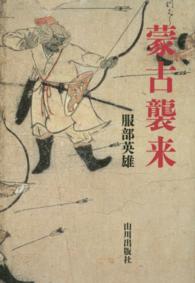- ホーム
- > 洋書
- > 英文書
- > History / World
Full Description
In August 1889, the five states that were once part of the Dakota 1861 Territory—North Dakota, South Dakota, Wyoming, Montana, and Idaho—drafted their state constitutions in preparation for inclusion in the United States. These constitutions were models of progressive and pragmatic values for their time. Wyoming, for instance, was the first state to grant women's suffrage. In addition to suffrage, delegates from these states banned child labor, curbed the power of railroads and grain monopolies, mandated state ownership of running water, opened voting eligibility, and created state-owned banks. These states, the "89ers," as Samuel Western calls them, exhibited a spirit of commonweal inclusivity that set them apart.Much has changed since—and not for the better. Today, legislators in these five states have spurned these inclusive values. Instead, they promote the narrative of exclusion and lean toward authoritarianism. Legislators restrict voting, disenfranchise Native Americans, limit protests, squash public education, and discourage immigration initiatives, such as sanctuary cities. In their current condition, these states are in direct contradiction of the pragmatically inclusive and progressive values of their 1889 constitutions. The 89ers today are driven by ideological objections to political autonomy (stripping power from cities), fueling partisanship, and a rigid commitment to traditional commodity-based industries. Western sees hope for the future, but only if these states replace their fidelity to a particular idea of rural America with a more pragmatic openness to diversity and change—which will paradoxically bring them closer to the original spirit of their constitutions.
Western calls for a radical rethinking of what rural America is and could be. As a long-time resident in Wyoming, he speaks not from the outside but as someone who personally cares about this region and its future prosperity. The Spirit of 1889 aims to shed light on how these states have drifted so far from where they began and what might be done to reclaim those original values.
Contents
Acknowledgments
Preface
Introduction
1. A Reckoning in August
2. The Poison Seed
3. Yield and Pounds Do Not a Community Make: The Case for Stewardship Agriculture
4. Cities of the Plains: The Cost of Demonizing Anything Urban
5. Dismantling the Cult of Commodity Prosperity: Breaking the Cycle of Victimhood and Resentment
Epilogue
Notes
Index







